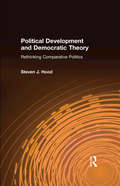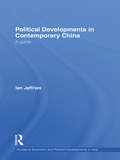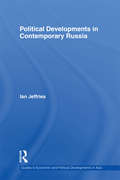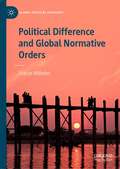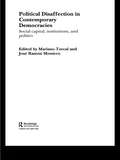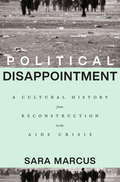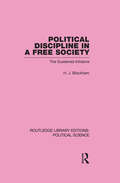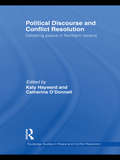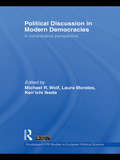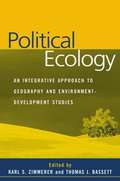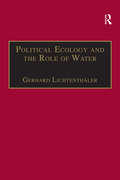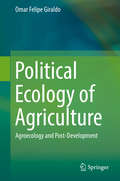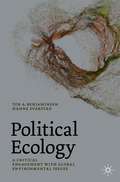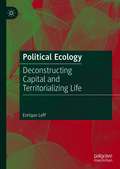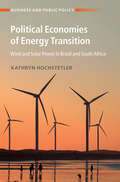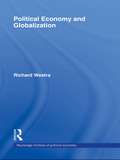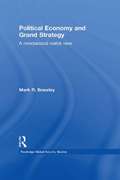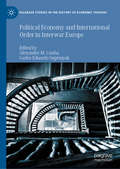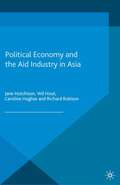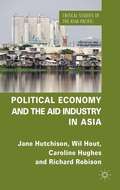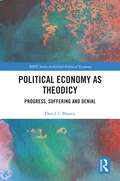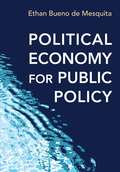- Table View
- List View
Political Development and Democratic Theory: Rethinking Comparative Politics
by Steven J. HoodMost comparativists have assumed that democratization is best understood by looking at regimes in the transition and consolidation phases of democracy without really considering the essence of democracy - liberal rights and democratic virtues. Democracy is seen as a mechanistic process without considering the ideas that build democratic regimes. This book begins afresh by proposing that comparativists need to consider democracy to be a combination of rights and virtues, and that the difficulties of democratic transitions, consolidation, and maintenance are essentially problems relating to balancing rights and virtues in the regime. How do we reemphasize these aspects of democracy at a time when comparative literature focuses almost solely on democratic procedure? By combining the best elements of comparative theory and liberal democratic philosophy, Hood argues that comparativists can sharpen the scholarly tools we need to understand both the problems of democratization and maintaining democracy. He provides the reader with a valuable overview of comparative theory and how our abandonment of political philosophy has led to our acceptance of social science methods that can only lead to superficial analyses of democratizing regimes and established democracies.
Political Development in Hong Kong: State, Political Society, and Civil Society
by Ma NgokThis book reviews the political development of Hong Kong before and after 1997, in particular the evolution of state-society relations in the last two decades, to analyze the slow development of democracy and governance in Hong Kong after 1997. This book is a most comprehensive analysis of the multi-faceted changes in Hong Kong in the last 20 years. The scope of changes analyzed included state functions and institutions, political changes such as party development and development of the Legislative Council, and social changes such as social movements, civil liberties, etc. It helps the reader understand the crisis of governance of Hong Kong after 1997, and the difficulty of democratic development in Hong Kong over the years. The book covers: changing state institutions in Hong Kong in the last few decades; party development in Hong Kong; the changing role and function of the legislature in Hong Kong; the evolution of social movement and movement organizational forms; media freedom, civil liberties, and the role of civil society; and theoretical discussions concerning governance problems and state-society relations in Hong Kong. Special emphasis is placed on how these changes brought about a new state-society relation, which in turn brought governance difficulties after 1997.
Political Developments in Contemporary China: A Guide (Guides to Economic and Political Developments in Asia)
by Ian JeffriesChina’s role in global events today cannot be overestimated. This book provides a comprehensive and detailed overview of contemporary political developments in China. Key topics covered include: China's international relations with its neighbours and with the international community more widely; demographic developments; Taiwan; Macao and Hong Kong, Tibet, Uighurs; human rights, health issues (including bird flu); food contamination and defective goods; and a chronology of political developments, congresses and Central Committee sessions since May 2006; the earthquake of 12 May 2008 and the 2008 Olympic Games. The book continues - and adds to – the overview of developments up to May 2006 which were covered in the author’s China: A Guide to Economic and Political Developments (2006), and is the companion volume to Economic Developments in Contemporary China: A Guide (2010) - both published by Routledge.
Political Developments in Contemporary Russia (Guides to Economic and Political Developments in Asia)
by Ian JeffriesThis book provides a comprehensive overview of political developments in Russia since late 2000, following on from where the author’s previous publication, The New Russia, left off. It covers all aspects of politics including the following: the highly centralized nature of power in Russia; central government and presidential elections; regional government and developments in the republics, including unrest in Chechnya and the other Caucasian republics; and human rights. Taking a chronological approach, it shows how politics overall has changed over the period, including how the relationship between Prime Minister (formerly President) Vladimir Putin and President Dmitri Medvedev has worked out. The book continues - and adds to – the overview of developments in the author’s The New Russia (2002), and is the companion volume to Economic Developments in Contemporary Russia (2011) - both published by Routledge.
Political Difference and Global Normative Orders (Global Political Sociology)
by Fränze WilhelmOnce considered a question of an international order based on consolidated statehood and homogeneous social communities within national borders, global order has become a question of alternative political articulations, resistance movements, and cultural diversity, among others. This book first critically analyzes the conditions for the struggles of theorizing global normative order in political and IR theory. Second, to make sense of the presence of difference and possibility for global normative order in view of the simultaneous absence of first foundations, the study draws on post-foundational thinking based on the seminal work of German philosopher Martin Heidegger and Argentine political theorist Ernesto Laclau. Finally, the author develops a theoretical framework for a hauntological approach to global normative order that provides an alternative and theoretically coherent explanation for the emergence of global order. This is of interest to scholars as well as practitioners (including activists) concerned with global social relations, global political discourse, and the construction of global identity and normative order(s).
Political Disaffection in Contemporary Democracies: Social Capital, Institutions and Politics (Routledge Research in Comparative Politics #Vol. 13)
by José Ramón Montero Mariano TorcalCitizens of many democracies are becoming more critical of basic political institutions and detached and disaffected from politics in general. This is a new comparative analysis of this trend that focuses on major democracies throughout Latin America, Asia and Central Europe. It brings together leading scholars to address three key areas of the current debate: the conceptual discussion surrounding political disaffection the factors causing voters to turn away from politics the actual consequences for democracy This is a highly relevant topic as representative democracies are coming to face new developments. It deals with the reasons and consequences of the so called ‘democratic deficit’ in a systematic way that enables the reader to develop a well-rounded sense of the area and its main debates. This book is an invaluable resource for all students of political science, sociology, cultural studies and comparative politics.
Political Disappointment: A Cultural History from Reconstruction to the AIDS Crisis
by Sara Marcus“Political Disappointment is an abundant text, overflowing with Sara Marcus’s considerable gifts. She is adept at presenting history and narrative with equal clarity; her writing is urgent but also optimistic. This is a book that is sometimes painful but never sacrifices hope or beauty.”—Hanif AbdurraqibMoving from the aftermath of Reconstruction through the AIDS crisis, a new cultural history of the United States shows how artists, intellectuals, and activists turned political disappointment—the unfulfilled desire for change—into a basis for solidarity.Sara Marcus argues that the defining texts in twentieth-century American cultural history are records of political disappointment. Through insightful and often surprising readings of literature and sound, Marcus offers a new cultural history of the last century, in which creative minds observed the passing of moments of possibility, took stock of the losses sustained, and fostered intellectual revolutions and unexpected solidarities.Political Disappointment shows how, by confronting disappointment directly, writers and artists helped to produce new political meanings and possibilities. Marcus first analyzes works by W. E. B. Du Bois, Charles Chesnutt, Pauline Hopkins, and the Fisk Jubilee Singers that expressed the anguish of the early Jim Crow era, during which white supremacy thwarted the rebuilding of the country as a multiracial democracy. In the ensuing decades, the Popular Front work songs and stories of Lead Belly and Tillie Olsen, the soundscapes of the civil rights and Black Power movements, the feminist poetry of Audre Lorde and Adrienne Rich, and the queer art of Marlon Riggs and David Wojnarowicz continued building the century-long archive of disappointment. Marcus shows how defeat time and again gave rise to novel modes of protest and new forms of collective practice, keeping alive the dream of a better world.Disappointment has proved to be a durable, perhaps even inevitable, feature of the democratic project, yet so too has the resistance it precipitates. Marcus’s unique history of the twentieth century reclaims the unrealized desire for liberation as a productive force in American literature and life.
Political Discipline in a Free Society (Routledge Library Editions: Political Science #40)
by H. J. BlackhamThis book traces the rise and fall of political philosophies since the 17th century. The second part of the book shows how the general technique of cumulative learning from experience applies to social legislation and social services, party politics to defence strategy and to the trends that follow the modern explosion of knowledge and capital. The main argument is that social control is at its best a deliberate joint creation of and learning from social experience; and in this sense political discipline although not the same as logical or scientific discipline is like them a submission to form, not force. The book gives a definite meaning to the idea of human progress and finds reason for a restoration of political hope and faith.
Political Discourse and Conflict Resolution: Debating Peace in Northern Ireland (Routledge Studies in Peace and Conflict Resolution)
by Katy HaywardThis book offers new insights into the close relationship between political discourses and conflict resolution through critical analysis of the role of discursive change in a peace process. Just as a peace process has many dimensions and stakeholders, so the discourses considered here come from a wide range of sources and actors. The book contains in-depth analyses of official discourses used to present the peace process, the discourses of political party leaders engaging (or otherwise) with it, the discourses of community-level activists responding to it, and the discourses of the media and the academy commenting on it. These discourses reflect varying levels of support for the peace process – from obstruction to promotion – and the role of language in moving across this spectrum according to issue and occasion. Common to all these analyses is the conviction that the language used by political protagonists and cultural stakeholders has a profound effect on progression towards peace. Bringing together leading experts on Northern Ireland’s peace process from a range of academic disciplines, including political science, sociology, linguistics, history, geography, law, and peace studies, this book offers new insights into the discursive dynamics of violent political conflict and its resolution.
Political Discussion in Modern Democracies: A Comparative Perspective (Routledge/ECPR Studies in European Political Science)
by Michael R. WolfThe study of political discussion has been broken into sub-categories including deliberative democracy, discursive studies, dynamics of interpersonal communication, and discussion network analyses, with substantial numbers of books and articles covering each. However, these areas are often treated distinctly and not brought together in a comprehensive and systematic way. Political Discussion in Modern Democracies: a comparative perspective reviews the breadth of the different literatures on political science and provides original comparative analyses of the nature of political discussion and its consequences on political deliberation and behaviour in numerous advanced industrial democracies worldwide. It is divided into two main sections that provide both a review of the field and context for the chapters that follow: Part I studies deliberation and discussion as the object of analysis. Part II concentrates on the consequences of political discussion and deliberation. Covering ten countries across Europe, Asia, and North and South America, this book makes a significant contribution toward broader theories of political communication, deliberative democracy, discussion networks, and political behaviour. It will be of interest to scholars of comparative politics, political communication, political behaviour, governance and democracy.
Political Ecology
by Karl Zimmerer Thomas J. BassettThis volume offers a unique, integrative perspective on the political and ecological processes shaping landscapes and resource use across the global North and South. Twelve carefully selected case studies demonstrate how contemporary geographical theories and methods can contribute to understanding key environment-and-development issues and working toward effective policies. Topics addressed include water and biodiversity resources, urban and national resource planning, scientific concepts of resource management, and ideas of nature and conservation in the context of globalization. Giving particular attention to evolving conceptions of nature-society interaction and geographical scale, an introduction and conclusion by the editors provide a clear analytical focus for the volume and summarize important developments and debates in the field.
Political Ecology and the Role of Water: Environment, Society and Economy in Northern Yemen (King's SOAS Studies in Development Geography)
by Gerhard LichtenthälerHow can we explain the over-exploitation and degradation of natural resources in the countries of the South? Population growth, poverty and problems associated with common property resource management have been common themes in this debate, yet insufficient attention has been paid to how traditional political relations and local perceptions affect natural resource capture and resource allocation. This is especially evident with respect to groups and communities at the political and geographical peripheries of state influence and control for whom self-identity is constructed around notions of autonomy and food self-sufficiency. This informative book addresses this omission by discussing water resource allocation and management. It focuses in particular on the socio-economic and political contexts which influence approaches to and determine practices of water management. Taking the example of the tribal communities of the Sa’dah basin in the northern Yemen, it analyzes the politics of environmental change, with particular reference to groundwater resource degradation, within the conceptual framework of political ecology .
Political Ecology of Agriculture: Agroecology and Post-Development
by Omar Felipe GiraldoThis study discusses an original proposal aimed at critically analyzing the power relations that exist in contemporary agriculture. The author endeavors herein to clarify some of the strategies that industrial agribusiness, in collusion with the state and multilateral structures, sets in motion in order to functionalize the lives of millions of farmers, so that their bodies, enunciations, and sensibilities can be repurposed in accordance with the dynamics of capital accumulation. The argument is based on the idea that agro-extractivism cannot be thought of exclusively as an economic-political and technological system, but as a complex interweaving of cultural meanings, aesthetics, and affections, which, amalgamated under the abstract name of "development", act as a support for the whole system's scaffolding. The book also explores the other side of the coin, describing how, and under what conditions, social movements are responding to the calamities generated by this model. The central thesis is that many ongoing agroecological processes are providing one of the most interesting guidelines at present for visualizing transitions towards post-development, post-extractivism, and the construction of multiple worlds beyond the sphere of capital. Political ecology of agriculture joins the calls that question the cultural project of modernity and the predatory sense imposed by the globalized food empire, and invites recognition of the importance of agroecology in the context of the end of the fossil-fuel era and the likely collapse of our industry-based civilization.
Political Ecology: A Critical Engagement with Global Environmental Issues
by Tor A. Benjaminsen Hanne SvarstadThis textbook introduces political ecology as an interdisciplinary approach to critically examine land and environmental issues. Drawing on discourse and narrative analysis, Marxist political economy and insights from natural science, the book points at similarities, differences and inter-connections between environmental governance in the global North and South. A wide range of carefully curated case studies are presented, with a particular focus on Africa and Norway. Key themes of power, justice and environmental sustainability run through all chapters. The authors challenge established views and leading discourses and present research findings that may surprise readers. Chapters cover topics including wildlife conservation, climate change and conflicts, land grabbing, the effects of population growth on the environment, jihadism in the African Sahel, bioprospecting, feminist political ecology, and struggles around carbon mitigation within a fossil fuel-based economy. This introductory text provides tools and examples for both undergraduate and postgraduate students to better understand on-going struggles about some of the world’s most urgent challenges.
Political Ecology: Deconstructing Capital and Territorializing Life
by Enrique LeffThis book offers a conceptual framework for the critical understanding of the present socio-environmental conflicts. It reflects on the evolution of subject and thought, a shift in environmental thinking triggered by the development of eco-territorial conflicts and the social responses given to the environmental question. Bringing together 40 years of the authors writing and research, the book explores the transition from ecological economics and historical materialism to ecological Marxism. It unpacks the forging of political ecology from value theory in political economy, to ecological distribution and ecologies of difference; a transition to an environmental rationality grounded in the ontology of diversity, a politics of difference and an ethics of otherness. This evolution in thinking gives consistency to a theoretical discourse able to respond to the territorial conflicts generated by the radicalization of the environmental question as a key social issue of our times. The book is a call to respond to the urgent challenge of reversing the tendency towards the entropic death of the planet and to building a sustainable world order.
Political Economies of Empire in the Early Modern Mediterranean
by Maria FusaroAgainst the backdrop of England's emergence as a major economic power, the development of early modern capitalism in general and the transformation of the Mediterranean, Maria Fusaro presents a new perspective on the onset of Venetian decline. Examining the significant commercial relationship between these two European empires during the period 1450–1700, Fusaro demonstrates how Venice's social, political and economic circumstances shaped the English mercantile community in unique ways. By focusing on the commercial interaction between Venice and England, she also re-establishes the analysis of the maritime political economy as an essential constituent of the Venetian state political economy. This challenging interpretation of some classic issues of early modern history will be of profound interest to economic, social and legal historians and provides a stimulating addition to current debates in imperial history, especially on the economic relationship between different empires and the socio-economic interaction between 'rulers and ruled'.
Political Economies of Energy Transition: Wind and Solar Power in Brazil and South Africa (Business and Public Policy)
by Kathryn HochstetlerGlobal climate solutions depend on low-carbon energy transitions in developing countries, but little is known about how those will unfold. Examining the transitions of Brazil and South Africa, Hochstetler reveals how choices about wind and solar power respond to four different constellations of interests and institutions, or four simultaneous political economies of energy transition. The political economy of climate change set Brazil and South Africa on different tracks, with South Africa's coal-based electricity system fighting against an existential threat. Since deforestation dominates Brazil's climate emissions, climate concerns were secondary there for electricity planning. Both saw significant mobilization around industrial policy and cost and consumption issues, showing the importance of economic considerations for electricity choices in emerging economies. Host communities resisted Brazilian wind power, but accepted other forms. Hochstetler argues that national energy transition finally depends on the intersection of these political economies, with South Africa illustrating a politicized transition mode and Brazil presenting a bureaucracy-dominant one.
Political Economies of the Middle East and North Africa
by Robert SpringborgDespite its oil wealth, the Middle East and North Africa is economically stagnating. Growth rates are comparatively unfavorable and insufficient to substantially improve citizens’ lives. Whether this economic inertia can be overcome or will continue into the indefinite future is a vital question that confronts both the region and the world. In this book leading Middle East scholar Robert Springborg discusses the economic future of this region by examining the national and regional political causes of its contemporary underperformance. Overgrown, weak MENA states, he explains, have been unable to escape their unfavorable historical legacies. “Limited access orders” and the deep states based in the means of coercion that underpin them undermine state capacities and constrain beneficial, autonomous political and economic activity. Increasingly challenged by their populations, MENA states face the daunting and so far unmet challenge of diversifying non-sustainable, rentier political economies away from direct or indirect dependence on oil and gas revenues. Stagnation of those revenues and failure to generate alternative income sources, combined with rapid population growth, presents the region with an economic challenge that can only be overcome by profound political change.
Political Economy and Globalization (Routledge Frontiers Of Political Economy Ser. #124)
by Richard WestraBased upon distinguishing capitalism from other economic systems, as well as analysis of capitalist change across its stages of development, Richard Westra argues that the economic tendencies we refer to as globalization constitute a world historic transition away from capitalism. Westra forcefully rejects claims from both Right and Left sides of economic debate that globalization embodies the ultimate world diffusion of capitalism. He concludes that the choice facing humanity is no longer between capitalism and socialism but between socialism and global barbarism. The argument is meticulously interwoven through four key foci of political economy - The role of Marx’s Capital in producing knowledge of capitalism, The periodizing of capitalism and study of its historical models, The altering trajectories of production and finance under current globalization, The place of socialism in a progressive future. A central point of the book is that determinations over the capitalist substance of existing economies demand precise understanding of how in its basic operation capitalism manages to secure the economic reproducibility of human society in the first place. To make the case for the passing of capitalism from history the volume draws upon the novel Japanese Uno approach to Marxian political economy. From the pages of Political Economy and Globalization emerges a grim picture of our human future should current economic trends persist. It also offers a positive vision for socio-material betterment in redistributive, eco-sensitive socialist societies of tomorrow. This is a must read book for scholars, students, progressive policy makers and activists.
Political Economy and Grand Strategy: A Neoclassical Realist View (Routledge Global Security Studies #Vol. 13)
by Mark R. BrawleyThis book examines traditional balance of power theory from a political-economic perspective, using historical examples, to draw out distinctions between the liberal and realist approach and how this affects grand strategy. The realist view of the balance of power theory includes implicit assumptions that economic assets can be turned quickly into power, and that states always respond to threats quickly and only with a view to the 'short-run'. These assumptions drive many of the expectations generated from traditional balance-of-power theory, discouraging realists from looking at domestic sources of power, which in turn undermined their ability to frame strategic decisions properly. By thinking about how power must be managed over time, however, we can model the choices policy-makers confront when determining expenditures on defense, while keeping an eye on the impact of those costs on the economy. By emphasizing the role of the state, identifying different causal patterns in domestic politics, and demonstrating the importance of systemic competition, this book aims to establish why a neo-classical realist approach is not only different from a liberal approach, but also superior when addressing questions on grand strategy. This book will be of much interest to students of security studies, international political economy, grand strategy and IR theory in general. Mark R. Brawley is Professor of Political Science at McGill University, Montreal, Canada. He is author of several books on International Relations, specialising in the connections between political economic issues and security.
Political Economy and International Order in Interwar Europe (Palgrave Studies in the History of Economic Thought)
by Carlos Eduardo Suprinyak Alexandre M. CunhaStandard histories of European integration emphasize the immediate aftermath of World War II as the moment when the seeds of the European Union were first sown. However, the interwar years witnessed a flurry of concern with the reconstruction of the world order, generating arguments that cut across the different social sciences, then plunged in a period of disciplinary soul-searching and feverish activism. Economics was no exception: several of the most prominent interwar economists, such as F. A. Hayek, Jan Tinbergen, Lionel Robbins, François Perroux, J. M. Keynes and Robert Triffin, contributed directly to larger public discussions on peace, order and stability. This edited volume combines these different strands of historical narrative into a unified framework, showing how political economy was integral to the interwar literature on international relations and, conversely, how economists were eager to incorporate international politics into their own concerns. The book brings together a group of scholars with varied disciplinary backgrounds, whose combined perspectives allow us to explore three analytical layers. The first part studies how different forms of economic knowledge, from economic programming to international finance, were used in the quest for a stable European order. The second part focuses on the existence of conflicting expectations about the role of social scientific knowledge, either as a source of technical solutions or as an input for enlightened public discussion. The third part illustrates how certain ideas and beliefs found concrete expression in specific institutional settings, which amplified their political leverage. The three parts are enclosed by an introductory essay, laying out the broad topics explored in the volume, and a substantial postscript tying all the historical threads together.
Political Economy and the Aid Industry in Asia (Critical Studies of the Asia-Pacific)
by J. Hutchison W. Hout C. Hughes R. RobisonAdopting a distinctive structural political economy approach, this book uniquely explains the blind spots of alternative political economy approaches to international aid, and presents an original framework for evaluating likely reformers' strength of commitment and potential alliances with donors.
Political Economy and the Aid Industry in Asia (Critical Studies of the Asia-Pacific)
by Caroline Hughes Jane Hutchison Wil Hout Richard RobisonAdopting a distinctive structural political economy approach, this book uniquely explains the blind spots of alternative political economy approaches to international aid, and presents an original framework for evaluating likely reformers' strength of commitment and potential alliances with donors.
Political Economy as Theodicy: Progress, Suffering and Denial (ISSN)
by David L. BlaneyPolitical Economy as Theodicy: Progress, Suffering and Denial proposes that political economics operates within a theological symbolic order that dictates modern sociopolitical and economic life as a whole.This book revisits the work of key figures in the history of political economy and economic thought – primarily Adam Smith, Bernard Mandeville, David Hume, Thomas Malthus, W. Stanley Jevons, Alfred Marshall and John Bates Clark. Theodicy is a constitutive element of an international political economy (IPE) that often disavows moral evil, while it conversely redefines such evil as an actual good within economic life. Beginning with the Enlightenment thinkers and continuing through to the modern neoclasscial economists, this book traces the initial emergence of a natural theological basis for political economic thinking and concludes with a discussion of its application in modern IPE. Relying upon a postcolonial framework, the author seeks to provincialize economics, creating space for alternative modes of being and doing.This book will appeal to scholars and advanced students of IPE, political theology, international relations and postcolonial studies.
Political Economy for Public Policy
by Ethan Bueno de Mesquita<p>This textbook uses modern political economy to introduce students of political science, government, economics, and public policy to the politics of the policymaking process. The book's distinct political economy approach has two virtues. By developing general principles for thinking about policymaking, it can be applied across a range of issue areas. It also unifies the policy curriculum, offering coherence to standard methods for teaching economics and statistics, and drawing connections between fields. <p>The book begins by exploring the normative foundations of policymaking―political theory, social choice theory, and the Paretian and utilitarian underpinnings of policy analysis. It then introduces game theoretic models of social dilemmas―externalities, coordination problems, and commitment problems―that create opportunities for policy to improve social welfare. Finally, it shows how the political process creates technological and incentive constraints on government that shape policy outcomes. Throughout, concepts and models are illustrated and reinforced with discussions of empirical evidence and case studies. <p>This textbook is essential for all students of public policy and for anyone interested in the most current methods influencing policymaking today. <p> <li>Comprehensive approach to politics and policy suitable for advanced undergraduates and graduate students <li>Models unify policy curriculum through methodological coherence <li>Exercises at the end of every chapter <li>Self-contained appendices cover necessary game theory <li>Extensive discussion of cases and applications</li> </p>
